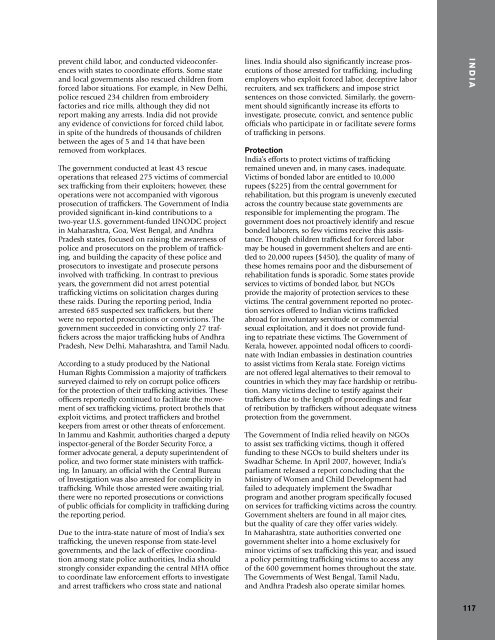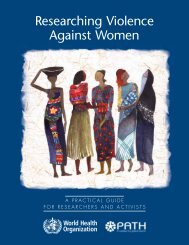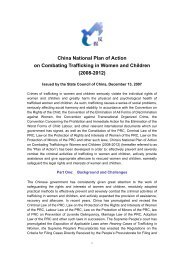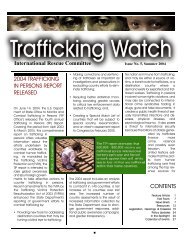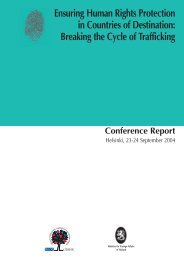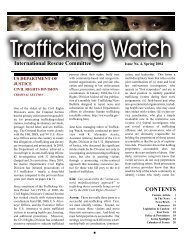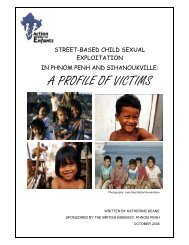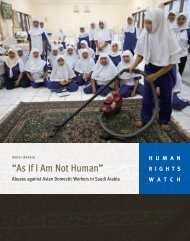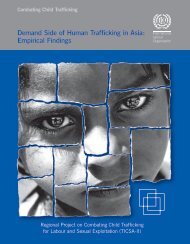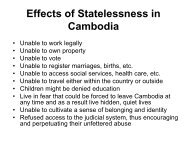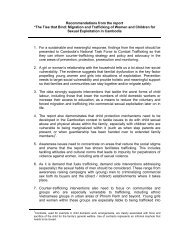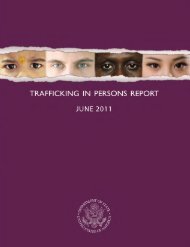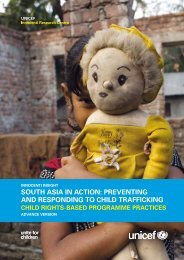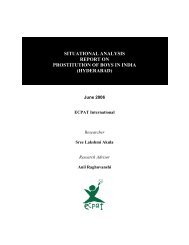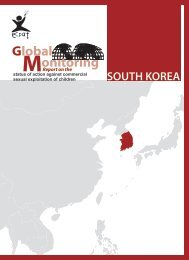2007 Trafficking in Persons Report - Center for Women Policy Studies
2007 Trafficking in Persons Report - Center for Women Policy Studies
2007 Trafficking in Persons Report - Center for Women Policy Studies
You also want an ePaper? Increase the reach of your titles
YUMPU automatically turns print PDFs into web optimized ePapers that Google loves.
prevent child labor, and conducted videoconferences<br />
with states to coord<strong>in</strong>ate ef<strong>for</strong>ts. Some state<br />
and local governments also rescued children from<br />
<strong>for</strong>ced labor situations. For example, <strong>in</strong> New Delhi,<br />
police rescued 234 children from embroidery<br />
factories and rice mills, although they did not<br />
report mak<strong>in</strong>g any arrests. India did not provide<br />
any evidence of convictions <strong>for</strong> <strong>for</strong>ced child labor,<br />
<strong>in</strong> spite of the hundreds of thousands of children<br />
between the ages of 5 and 14 that have been<br />
removed from workplaces.<br />
The government conducted at least 43 rescue<br />
operations that released 275 victims of commercial<br />
sex traffick<strong>in</strong>g from their exploiters; however, these<br />
operations were not accompanied with vigorous<br />
prosecution of traffickers. The Government of India<br />
provided significant <strong>in</strong>-k<strong>in</strong>d contributions to a<br />
two-year U.S. government-funded UNODC project<br />
<strong>in</strong> Maharashtra, Goa, West Bengal, and Andhra<br />
Pradesh states, focused on rais<strong>in</strong>g the awareness of<br />
police and prosecutors on the problem of traffick<strong>in</strong>g,<br />
and build<strong>in</strong>g the capacity of these police and<br />
prosecutors to <strong>in</strong>vestigate and prosecute persons<br />
<strong>in</strong>volved with traffick<strong>in</strong>g. In contrast to previous<br />
years, the government did not arrest potential<br />
traffick<strong>in</strong>g victims on solicitation charges dur<strong>in</strong>g<br />
these raids. Dur<strong>in</strong>g the report<strong>in</strong>g period, India<br />
arrested 685 suspected sex traffickers, but there<br />
were no reported prosecutions or convictions. The<br />
government succeeded <strong>in</strong> convict<strong>in</strong>g only 27 traffickers<br />
across the major traffick<strong>in</strong>g hubs of Andhra<br />
Pradesh, New Delhi, Maharashtra, and Tamil Nadu.<br />
Accord<strong>in</strong>g to a study produced by the National<br />
Human Rights Commission a majority of traffickers<br />
surveyed claimed to rely on corrupt police officers<br />
<strong>for</strong> the protection of their traffick<strong>in</strong>g activities. These<br />
officers reportedly cont<strong>in</strong>ued to facilitate the movement<br />
of sex traffick<strong>in</strong>g victims, protect brothels that<br />
exploit victims, and protect traffickers and brothel<br />
keepers from arrest or other threats of en<strong>for</strong>cement.<br />
In Jammu and Kashmir, authorities charged a deputy<br />
<strong>in</strong>spector-general of the Border Security Force, a<br />
<strong>for</strong>mer advocate general, a deputy super<strong>in</strong>tendent of<br />
police, and two <strong>for</strong>mer state m<strong>in</strong>isters with traffick<strong>in</strong>g.<br />
In January, an official with the Central Bureau<br />
of Investigation was also arrested <strong>for</strong> complicity <strong>in</strong><br />
traffick<strong>in</strong>g. While those arrested were await<strong>in</strong>g trial,<br />
there were no reported prosecutions or convictions<br />
of public officials <strong>for</strong> complicity <strong>in</strong> traffick<strong>in</strong>g dur<strong>in</strong>g<br />
the report<strong>in</strong>g period.<br />
Due to the <strong>in</strong>tra-state nature of most of India’s sex<br />
traffick<strong>in</strong>g, the uneven response from state-level<br />
governments, and the lack of effective coord<strong>in</strong>ation<br />
among state police authorities, India should<br />
strongly consider expand<strong>in</strong>g the central MHA office<br />
to coord<strong>in</strong>ate law en<strong>for</strong>cement ef<strong>for</strong>ts to <strong>in</strong>vestigate<br />
and arrest traffickers who cross state and national<br />
l<strong>in</strong>es. India should also significantly <strong>in</strong>crease prosecutions<br />
of those arrested <strong>for</strong> traffick<strong>in</strong>g, <strong>in</strong>clud<strong>in</strong>g<br />
employers who exploit <strong>for</strong>ced labor, deceptive labor<br />
recruiters, and sex traffickers; and impose strict<br />
sentences on those convicted. Similarly, the government<br />
should significantly <strong>in</strong>crease its ef<strong>for</strong>ts to<br />
<strong>in</strong>vestigate, prosecute, convict, and sentence public<br />
officials who participate <strong>in</strong> or facilitate severe <strong>for</strong>ms<br />
of traffick<strong>in</strong>g <strong>in</strong> persons.<br />
Protection<br />
India’s ef<strong>for</strong>ts to protect victims of traffick<strong>in</strong>g<br />
rema<strong>in</strong>ed uneven and, <strong>in</strong> many cases, <strong>in</strong>adequate.<br />
Victims of bonded labor are entitled to 10,000<br />
rupees ($225) from the central government <strong>for</strong><br />
rehabilitation, but this program is unevenly executed<br />
across the country because state governments are<br />
responsible <strong>for</strong> implement<strong>in</strong>g the program. The<br />
government does not proactively identify and rescue<br />
bonded laborers, so few victims receive this assistance.<br />
Though children trafficked <strong>for</strong> <strong>for</strong>ced labor<br />
may be housed <strong>in</strong> government shelters and are entitled<br />
to 20,000 rupees ($450), the quality of many of<br />
these homes rema<strong>in</strong>s poor and the disbursement of<br />
rehabilitation funds is sporadic. Some states provide<br />
services to victims of bonded labor, but NGOs<br />
provide the majority of protection services to these<br />
victims. The central government reported no protection<br />
services offered to Indian victims trafficked<br />
abroad <strong>for</strong> <strong>in</strong>voluntary servitude or commercial<br />
sexual exploitation, and it does not provide fund<strong>in</strong>g<br />
to repatriate these victims. The Government of<br />
Kerala, however, appo<strong>in</strong>ted nodal officers to coord<strong>in</strong>ate<br />
with Indian embassies <strong>in</strong> dest<strong>in</strong>ation countries<br />
to assist victims from Kerala state. Foreign victims<br />
are not offered legal alternatives to their removal to<br />
countries <strong>in</strong> which they may face hardship or retribution.<br />
Many victims decl<strong>in</strong>e to testify aga<strong>in</strong>st their<br />
traffickers due to the length of proceed<strong>in</strong>gs and fear<br />
of retribution by traffickers without adequate witness<br />
protection from the government.<br />
The Government of India relied heavily on NGOs<br />
to assist sex traffick<strong>in</strong>g victims, though it offered<br />
fund<strong>in</strong>g to these NGOs to build shelters under its<br />
Swadhar Scheme. In April <strong>2007</strong>, however, India’s<br />
parliament released a report conclud<strong>in</strong>g that the<br />
M<strong>in</strong>istry of <strong>Women</strong> and Child Development had<br />
failed to adequately implement the Swadhar<br />
program and another program specifically focused<br />
on services <strong>for</strong> traffick<strong>in</strong>g victims across the country.<br />
Government shelters are found <strong>in</strong> all major cites,<br />
but the quality of care they offer varies widely.<br />
In Maharashtra, state authorities converted one<br />
government shelter <strong>in</strong>to a home exclusively <strong>for</strong><br />
m<strong>in</strong>or victims of sex traffick<strong>in</strong>g this year, and issued<br />
a policy permitt<strong>in</strong>g traffick<strong>in</strong>g victims to access any<br />
of the 600 government homes throughout the state.<br />
The Governments of West Bengal, Tamil Nadu,<br />
and Andhra Pradesh also operate similar homes.<br />
I N D I A<br />
117


